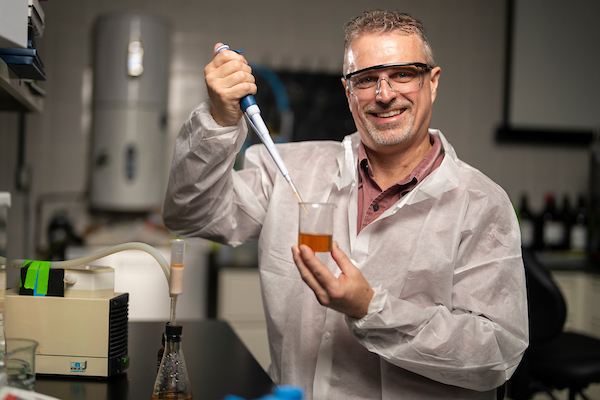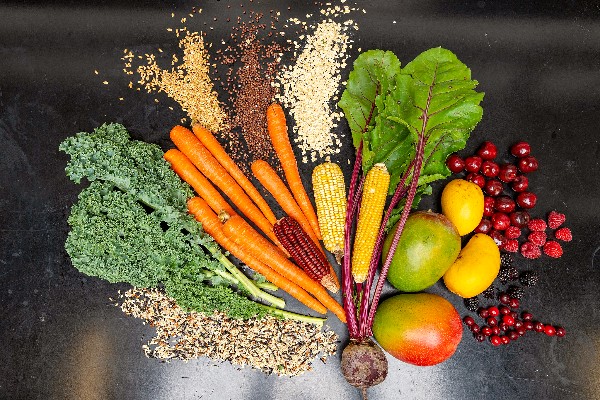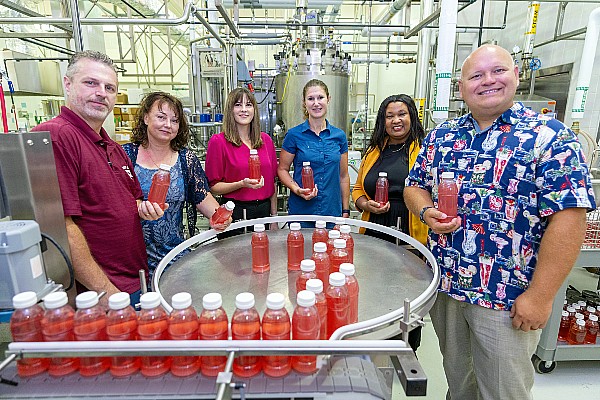From carrots to cutting-edge research: Stephen Talcott’s journey in food science
Transforming food quality and innovation from campus labs to global brands

Since he was young, Stephen Talcott, Ph.D., professor of food chemistry at the Texas A&M College of Agriculture and Life Sciences Department of Food Science and Technology, has always been interested in science.
But it was during his time as an undergraduate student at Texas A&M University that he met dairy chemist Charles Dill, Ph.D., and became “hooked” on food science and technology. Dill and Talcott’s research experiences in the lab of Ron Richter, Ph.D., analyzing cheddar cheese, laid the foundation for his future career.
“Dr. Dill enrolled me in a full semester of food science classes and told me to sink or swim, and I’ve been swimming ever since,” Talcott said. “I was honored many years later to be hired into the position that the late Dr. Dill once held, teaching food chemistry.”
As a graduate student, he was funded by Gerber, the baby food company, and provided free run of its Arkansas processing plant to set about making quality changes to its products.
“I saw firsthand how food processing methods can impact food quality and shelf-life. I’m proud to say that, to this day, my research helped Gerber radically change how they manufacture baby foods.”
Food science is really a people industry. It’s an industry looking to create products to feed people and bring them joy and a better life.”
Stephen Talcott, Ph.D.
professor of food chemistry
Carrot research leads to food quality improvements
Talcott said carrots were the figurative “carrot,” incentivizing him to investigate other avenues in his research.
“It all started with carrots, which have vitamins, minerals and phytonutrients,” he said. “In my studies with Gerber on processing factors that influence the stability of those nutrients, I found the world of phytochemicals, namely antioxidant polyphenolics. I have been investigating these compounds for about 30 years now.”

He said while people generally understand that foods like carrots are “good for them,” research on such foods allows for a better understanding of how humans respond to phytochemicals, how these phytochemicals modulate gut bacteria and the way they metabolize and absorb beneficial compounds in the diet.
Talcott’s research has expanded into investigations of phytochemicals in fruits and vegetables, antioxidant stability and assessment, postharvest retention, beverage processing, and value-added products. Additional investigations include phytochemical identification, quantification and stability in tropical and subtropical fruits and vegetables, including acai, mango, guava, passion fruit and grapes.
Talcott said he has tried to list all the fruits, vegetables and botanicals he has chemically evaluated over the years but eventually gave up on the effort as the list continued to grow.
Improving the food and beverage industry
Talcott said he has been fortunate to work with some of the largest food and beverage companies in the U.S., as well as some of the smallest startups. This includes helping them improve product quality, create new processes, source ingredients, develop new products and create science-based marketing.

“What I find universal is that there is an insatiable desire for food companies to innovate, to be the nexus in their field, and bring to market new, exciting, healthy and delicious foods and supplements that benefit the consumer,” he said. “Food science is really a people industry. It’s an industry looking to create products to feed people and bring them joy and a better life.”
Some of the work from Talcott’s lab includes developing or enhancing beverages using bioactive ingredients, addressing taste and aroma challenges for food companies, and innovating, improving or optimizing various food products.
The Department of Food Science and Technology’s active engagement with various food and beverage companies nationwide and globally is also an advantage for its students seeking a career in food science and technology.
“We have had a long-term relationship with many of these companies, and they frequently come to Texas A&M looking for talent to fill technical and other positions in food science,” Talcott said. “They appreciate the hands-on training we provide, as well as the depth and breadth of knowledge we impart to our students. As a result, many of our students are hired by the same companies we work with on our research and product development.”
Food science innovations for health and wellness
Talcott said he believes the research and trials conducted in the department — and the food innovations developed as a result — will provide benefits long into the future.
“Our research is multidisciplinary, and our team consists of experts in food engineering, nutrition, dietetics, nursing, food processing and food chemistry,” he said. “Research is a team sport, and there is no ‘I’ in research. It is important to value the expertise and knowledge that each person brings to the research team to solve problems and make discoveries that benefit people and the food industry.”
Talcott said novel food products are driven by healthy ingredients, targeted bioactive compounds, “clean labels” showing a product is minimally processed and free of artificial ingredients or preservatives, and a desire to know if the product has measurable health benefits. He said these factors drive product sustainability and validate the benefits for those consuming the products.
Talcott added the department’s multidisciplinary research team has helped food companies understand more precisely how their products work inside the human body.
“We can help determine such factors as how food processing can influence the absorption of key nutrients, how these nutrients interact with our gut bacteria and how these compounds influence complex bioactive roles in the body. These are critical factors for the future of the food industry, as new products manufactured by new technologies and containing new functional ingredients find a place on the shelves at local supermarkets.”
Talcott’s focus on food science students
Talcott, Aggie class of ’94 and ’97, said he can still point to the classroom chairs where he sat while taking food chemistry, food microbiology, food processing, food engineering and other courses some three decades ago.
“It is such an honor to train the next generation of students in Aggieland and to see them leave and become leaders in their fields quickly,” Talcott said. “Our hands-on training opportunities, personal interactions and countless learning opportunities are vital for their career development.”
Talcott said while grades are important, he tells his students the most important things are the experiences, knowledge and passion they will bring to the world of food science.


